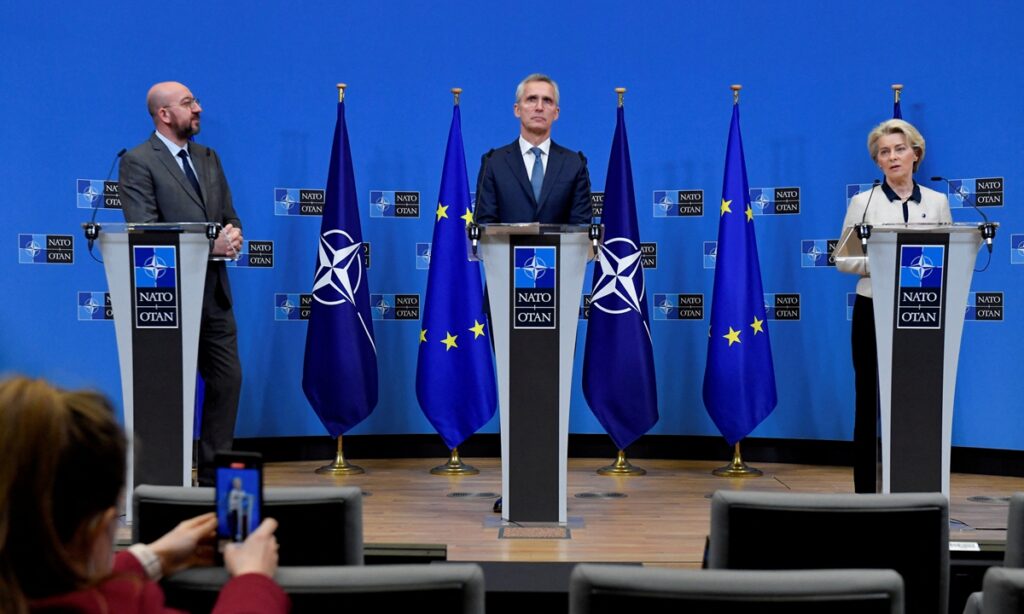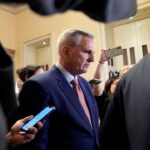NATO, a relic left over from the Cold War, and the EU, a political and economic union of sovereign countries, signed a joint declaration on Tuesday, vowing to take their strategic partnership “to the next level” to tackle common challenges. What common challenges? The declaration named Russia by name for the ongoing conflict, and then took aim at China, with a tone as that during the Cold War.
Signed by Charles Michel, president of the European Council, Ursula von der Leyen, president of the European Commission, and Jens Stoltenberg, secretary general of the NATO, the declaration stated that “we condemn in the strongest possible terms Russia’s aggression,” and that “China’s growing assertiveness and policies present challenges that we need to address.”
NATO is practically dominated by the US. But the EU still tries to pursue independent diplomacy. Washington, however, has its wishful calculation – emasculating EU’s efforts in safeguarding its own security, including establishing a new rapid reaction force, via tightly bonding it with NATO, Song Zhongping, a Chinese military expert and TV commentator, told the Global Times.
Washington is setting Brussels up by naming China in the joint declaration. The US takes China as a serious rival, yet it does not plan to play this power game all alone by itself. So it is attempting to turn the EU into its military and logistics base, and transfer European capital, resources, manpower and even military strength to the Asia-Pacific region to counter China, Song noted. The so-called strategic partnership is merely a catchy name for US’ hunt for obedience from the EU.
The way the statement touched upon China is filled with condescending arrogance of Western centrism. It shows some Western elites want to “fix” China’s policy. How ironic that the West, known for its gunboat diplomacy power politics, is accusing other countries of being “assertive.” The unspoken message in the declaration is – why can’t China be submissive when it is bullied by the West, Shen Yi, a professor at Fudan University, said.
Setting aside how NATO provoked Russia in the first place before the conflict, has China in any form threatened the EU or NATO? Not one proof can be listed. Yet the US-led NATO seems determined to teach China a lesson while fighting the proxy war against Russia. As dreamy as it may seem for Washington, it knows well it has no such strength in hand. So it ties the EU up on its strategy.
Some netizens commented: “EU strategic autonomy, RIP.” It is obvious that the US is crippling the EU’s overall capability of diplomacy, economic autonomy and military power. This is the reason why Washington keeps fanning flames of the Russia-Ukraine conflict – to make European countries yearn for US security umbrella, Song said.
Both NATO and the EU are inter-governmental organizations, but the manner showed in the statement seems to come from a “supranational power,” which believes it can rule the world and even seas would rise when it gives the word. This is a tone with swelling egos. The three signatories are vivid examples of Western centrism and hegemony.
“The Russian threat is the most immediate, but not the only one. We witness China’s increasing attempts to reshape the global order to its benefits,” tweeted Von der Leyen after signing the declaration. By “global order” she means the order made up by a small group of US-led Western countries, and imposed on the rest of the world. Not listening to the Western order would be “reshaping” the order.
This is not surprising, as Von der Leyen has long been playing the role as a spokesperson of US interests One can often find the sense of “America First” in her statement, Song told Global Times.
For example, “sanctions are here to stay” is one of her loudest messages during the Russia-Ukraine conflict, even when a difficult winter was ahead. When some Europeans reflect what those suicidal sanctions and proxy war have brought to their homeland, one answer is apparent – they are left with no choices but paying four times more for gas from the US.
At the moment, the real challenges confronting the EU are supposed to be the recession, inflation, de-industrialization and the loss of strategic autonomy. The EU better be cautious not to be tricked by the wildly arrogant politicians.
NATO, which long lost the cause of existence, is sparing no effort to prolong its life. It is deliberately creating enemies, when it could have no enemy at all. But the EU could avoid being taken hostage by the military organization, or ending up as a US pet.
(Global Times)



